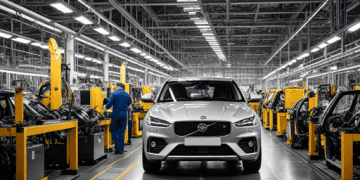The UK government has outlined measures to support its automotive sector, which has been impacted by new tariffs imposed by the United States. The tariffs, which levy a 25 percent charge on imported vehicles, have added pressure on the global auto industry, including UK manufacturers.
Jaguar Land Rover, a prominent luxury car manufacturer, confirmed that it would pause shipments to the U.S. in April due to the new trading terms. In response, UK Prime Minister Keir Starmer expressed his readiness to intervene and support sectors affected by the tariffs, and subsequently unveiled a series of initiatives aimed at boosting the auto industry.
Among the announced measures, the UK government confirmed that it will ban the sale of petrol and diesel cars by 2030, with hybrid vehicles allowed until 2035. The government has already committed £2.3 billion to accelerate the production of electric vehicles. Additionally, the government introduced more flexible rules regarding the transition to electric vehicles, allowing car manufacturers to fall short of annual production targets for electric vehicles until 2026, provided the shortfall is made up before 2030.
The new support package also includes exemptions for small and micro-volume manufacturers, such as luxury car brands McLaren and Aston Martin, from the 2030 targets. Additionally, vehicles with internal combustion engines will be permitted for sale until 2035.
The UK automotive industry, which employs over 152,000 people and contributes £19 billion annually to the economy, will continue to receive support as the long-term impact of the tariffs becomes clearer, the government stated.
Get comprehensive supply chain report news updates at The Supply Chain Report. For international trade tools, see ADAMftd.com.
#UKAutoSector #TariffImpact #ElectricVehicles #UKGovernmentSupport #JaguarLandRover #GlobalTrade #AutomotiveIndustry #TransitionToElectric #UKEconomy #VehicleTariffs















